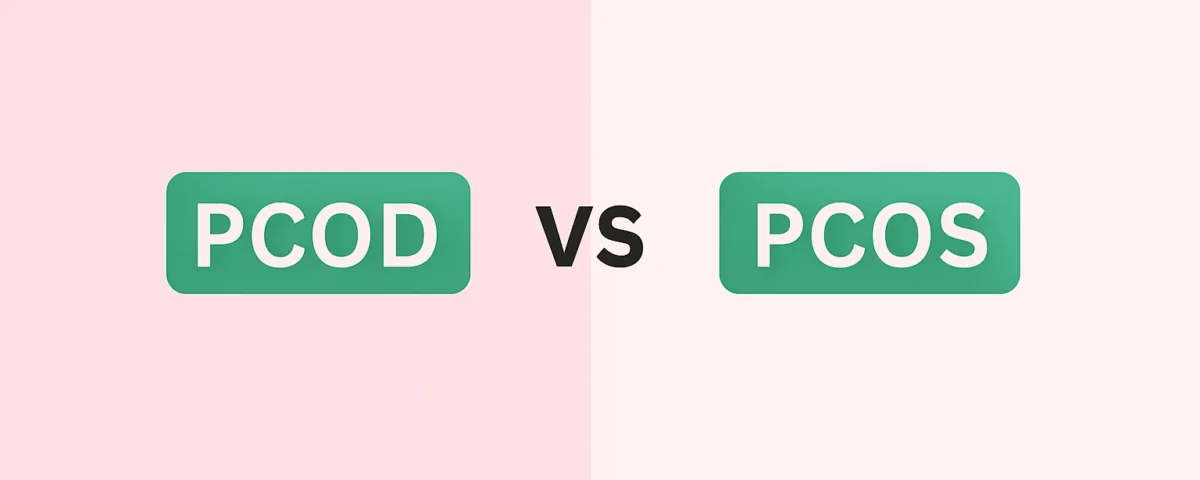PCOD vs PCOS: Full Form, Meaning, and Key Differences Explained

Tubectomy: Meaning, Procedure, and Being Tubectomised
June 12, 2025Introduction
Hormonal disorders in women have become increasingly common in today’s fast-paced lifestyle, often affecting physical health, emotional well-being, and reproductive functions. Among these, PCOD (Polycystic Ovarian Disease) and PCOS (Polycystic Ovary Syndrome) are two of the most prevalent yet often misunderstood conditions. Both disorders are related to hormonal imbalances and irregularities in the menstrual cycle, but they differ significantly in terms of severity, symptoms, and long-term impact on fertility and metabolism.
Understanding the difference between PCOD and PCOS is crucial, especially for women of reproductive age. While these conditions are treatable, early diagnosis and the right medical approach can prevent complications such as infertility, diabetes, obesity, and cardiovascular issues. In this blog, we break down the full forms, meanings, causes, and differences between PCOD and PCOS to help you make informed health decisions and seek timely support from medical experts.
What is PCOD?
PCOD full form is Polycystic Ovarian Disease. It is a hormonal condition in which a woman’s ovaries produce immature or partially mature eggs, which over time turn into cysts. These cysts accumulate in the ovaries, leading to them becoming enlarged and causing an imbalance in reproductive hormones.
If you’re wondering what is PCOD or PCOD means what, it essentially refers to a condition that disrupts normal ovulation. Women with PCOD often experience irregular menstrual cycles, weight gain, excessive hair growth (hirsutism), acne, and sometimes difficulty in conceiving.
The causes of PCOD are often linked to poor lifestyle habits, stress, hormonal imbalance, and insulin resistance. While PCOD is quite common and manageable, it requires proper medical guidance, lifestyle adjustments, and regular monitoring to prevent long-term complications. Identifying the symptoms early and consulting a gynecologist can help in effective treatment and control of the condition.
What is PCOS?
PCOS full form is Polycystic Ovary Syndrome, a more complex and serious hormonal disorder compared to PCOD. If you’re searching for the PCOS meaning, it refers to a condition where the ovaries produce higher-than-normal levels of male hormones (androgens), leading to irregular ovulation or no ovulation at all.
Unlike PCOD, PCOS is classified as a syndrome because it involves a combination of symptoms and long-term health risks. It not only affects the ovaries but also disrupts the body’s hormonal balance, insulin resistance, and metabolism. Women with PCOS may experience symptoms like missed or irregular periods, weight gain, thinning hair, acne, and increased facial or body hair.
PCOS also has more serious implications for fertility and overall health. If left untreated, it can increase the risk of type 2 diabetes, heart disease, endometrial cancer, and complications during pregnancy. Early diagnosis and holistic treatment are essential for managing PCOS effectively.
PCOD vs PCOS: The Core Differences
While both PCOD and PCOS are hormonal disorders affecting the ovaries, they differ in terms of complexity, severity, and long-term impact. Understanding the difference between PCOS and PCOD is essential for timely diagnosis and appropriate treatment. Below is a simplified table to highlight the PCOD and PCOS difference based on key health factors.
| Factor | PCOD | PCOS |
| Severity | Comparatively milder; does not always lead to major health complications | More severe; classified as a metabolic and endocrine disorder |
| Hormonal Imbalance | Mild hormonal fluctuation | High androgen levels causing significant hormonal disruption |
| Impact on Fertility | May not affect fertility significantly; women can conceive with lifestyle changes | Often causes infertility due to lack of ovulation |
| Treatment Approach | Lifestyle changes, diet, exercise, occasional medication | Requires medical intervention, hormonal therapy, and metabolic regulation |
| Long-Term Health Implications | Rarely leads to serious health issues if managed early | Increases risk of diabetes, obesity, cardiovascular issues, and infertility |
In summary, PCOD vs PCOS is a comparison of degree and effect — PCOD being more common and manageable, while PCOS is more serious with broader health consequences. Knowing the difference in PCOD and PCOS helps in choosing the right medical support and prevention strategy.
Causes and Risk Factors
Both PCOD and PCOS share several underlying causes, yet their severity and long-term effects vary. The most common contributing factors include genetics, lifestyle, obesity, and insulin resistance.
A family history of hormonal disorders increases the likelihood of developing either condition. Poor lifestyle choices such as unhealthy eating habits, lack of physical activity, high-stress levels, and disrupted sleep can further trigger hormonal imbalances. Obesity worsens symptoms by increasing insulin resistance, which is a core issue in both disorders.
However, the risk factors differ in intensity between PCOD and PCOS. In PCOD, lifestyle factors play a dominant role and symptoms can often be managed with routine changes. PCOS, on the other hand, is more influenced by metabolic and endocrine disturbances, often requiring medical intervention beyond lifestyle adjustments. Additionally, PCOS is more closely linked to long-term health issues such as diabetes, infertility, and cardiovascular disease, making early detection and treatment essential.
Diagnosis and Tests
Diagnosing PCOD and PCOS involves a combination of medical history, physical examination, and diagnostic tests. While both conditions present similar symptoms, proper evaluation helps differentiate between the two for accurate treatment.
Doctors begin with a detailed discussion of the patient’s symptoms, menstrual history, weight changes, acne, and hair growth patterns. A pelvic ultrasound is often recommended to check for enlarged ovaries or the presence of multiple small cysts. In PCOD, the ovaries may appear bulky with partially matured eggs, whereas in PCOS, the number of cysts is usually higher, and ovulation may be absent.
Blood tests play a critical role in measuring hormone levels, especially androgens (male hormones), insulin, LH (Luteinizing Hormone), FSH (Follicle-Stimulating Hormone), and thyroid function. These tests help determine if there is a significant hormonal imbalance and whether insulin resistance is contributing to the condition.
Treatment Options
Treatment for PCOD and PCOS focuses on symptom management, improving ovulation, and preventing long-term complications. While there is no permanent cure, a combination of medical and lifestyle interventions can help control the symptoms effectively.
Lifestyle modifications are the first step and often the most effective, especially for PCOD. This includes regular exercise, weight management, a balanced diet, stress reduction, and quality sleep. These changes help regulate periods, improve insulin sensitivity, and boost fertility.
In more severe or resistant cases, medications may be prescribed. These include hormonal contraceptives to regulate menstrual cycles and reduce androgen levels, and insulin-sensitizing agents like metformin for those with insulin resistance.
For women trying to conceive, fertility treatments such as ovulation induction, IUI, or IVF may be considered. In such cases, consulting a specialist at an Infertility Clinic is advisable for tailored reproductive care.
PCOD and PCOS: Which is More Serious?
While both PCOD and PCOS can affect a woman’s hormonal health and reproductive system, PCOS is generally considered more serious due to its broader and more chronic impact on the body. PCOD is often lifestyle-induced and can be managed effectively with diet, exercise, and minimal medical intervention. However, PCOS is a more complex endocrine disorder that not only disrupts ovulation but also leads to long-term health risks.
Women with PCOS are at a higher risk of developing type 2 diabetes, high blood pressure, high cholesterol, endometrial cancer, and heart disease. The condition also has a significant effect on mental health, contributing to anxiety, depression, and low self-esteem. These complications can greatly affect a woman’s quality of life, especially if left untreated.
When to Consult a Doctor
Recognizing early signs of hormonal imbalance can help prevent the condition from worsening. Common warning signs include irregular or missed periods, sudden weight gain, excessive hair growth, severe acne, thinning hair on the scalp, and difficulty in conceiving. If any of these symptoms persist, it’s crucial to seek medical attention.
Early diagnosis and intervention can greatly improve health outcomes and prevent long-term complications. Consulting a specialist in Obstetrics and Gynecology is essential for a thorough evaluation, accurate diagnosis, and personalized treatment plan. They can help manage symptoms, restore hormonal balance, and guide you through fertility-related concerns if needed.
Whether it’s PCOD or PCOS, timely medical care ensures that you stay in control of your health, reduce risks, and enhance your overall well-being.
Conclusion
In summary, while PCOD and PCOS are often confused, they are distinct conditions with different implications for a woman’s health. PCOD (Polycystic Ovarian Disease) is more common and generally manageable with lifestyle changes. PCOS (Polycystic Ovary Syndrome), on the other hand, is more severe and can lead to long-term health issues like infertility, diabetes, and heart disease if not treated properly.
Understanding the key differences—such as severity, hormonal imbalance, and impact on fertility—empowers women to take control of their reproductive and overall health. If you experience symptoms like irregular periods, acne, excessive hair growth, or difficulty conceiving, it’s important not to ignore them.
Timely consultation with healthcare professionals is crucial. Depending on the diagnosis, treatment may range from simple lifestyle adjustments to hormonal therapies and fertility care. For those also concerned about intimate health and well-being, specialized services like Cosmetic Gynecology are available for enhanced confidence and comfort.
FAQs
Is PCOD more serious than PCOS?
No, PCOD (Polycystic Ovarian Disease) is generally less serious than PCOS (Polycystic Ovary Syndrome). While both are hormonal disorders affecting the ovaries, PCOD usually involves the formation of immature eggs that turn into cysts, leading to irregular periods and minor fertility issues. PCOS, however, is a more severe endocrine disorder that causes higher androgen levels, absent ovulation, and insulin resistance. The long-term risks of PCOS include diabetes, heart disease, and infertility, making it a more complex condition to manage. Understanding the difference between PCOD and PCOS is essential for proper diagnosis and treatment.
Can a PCOD girl get pregnant?
Yes, a PCOD girl can get pregnant, especially with the right lifestyle modifications and medical support. Unlike PCOS, which often disrupts ovulation entirely, women with PCOD may still ovulate irregularly, making conception possible. With regular exercise, a balanced diet, and stress management, hormonal levels can improve naturally. In some cases, medications may be recommended to support ovulation. It’s important to consult a gynecologist for personalized care. Understanding what is PCOD and addressing it early increases the chances of a healthy pregnancy while minimizing potential complications.
What are PCOD girl symptoms?
A PCOD girl may experience several hormonal imbalance symptoms, including irregular menstrual cycles, acne, excessive hair growth, weight gain, and ovarian cysts. One of the earliest signs is irregular periods, which indicate disrupted ovulation. Some may also face mood swings, fatigue, or difficulty conceiving. These symptoms can vary from mild to moderate and often overlap with other conditions, making diagnosis challenging. Knowing PCOD full form—Polycystic Ovarian Disease—and recognizing early symptoms allows for timely medical attention. Lifestyle changes and treatment can help manage these symptoms effectively and improve overall hormonal health.
Why is PCOD now called PCOS?
While PCOD and PCOS are sometimes used interchangeably, they are actually different. However, the confusion often arises because PCOS (Polycystic Ovary Syndrome) is a more updated and medically accepted term used globally, whereas PCOD (Polycystic Ovarian Disease) is more commonly referred to in countries like India. PCOS is considered a syndrome because it involves a collection of symptoms and systemic hormonal disruptions beyond the ovaries, including insulin resistance and metabolic issues. The shift in terminology reflects the broader health implications and the need to address PCOD and PCOS difference for accurate diagnosis and care.




